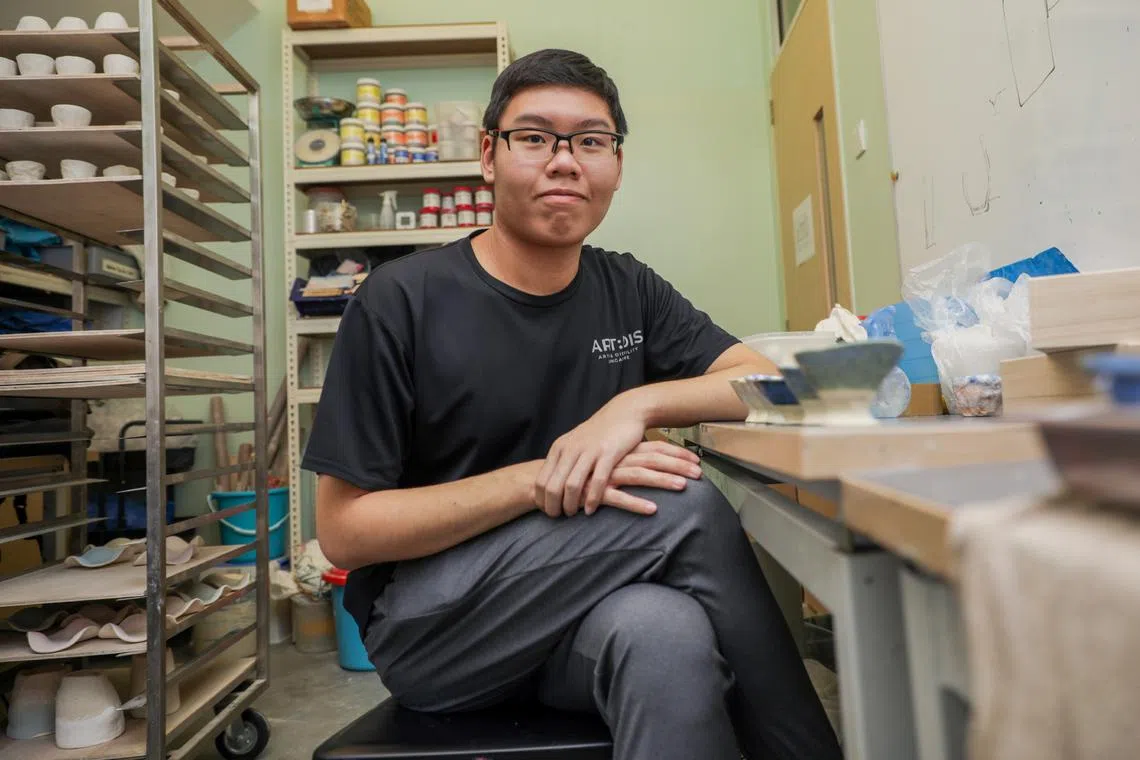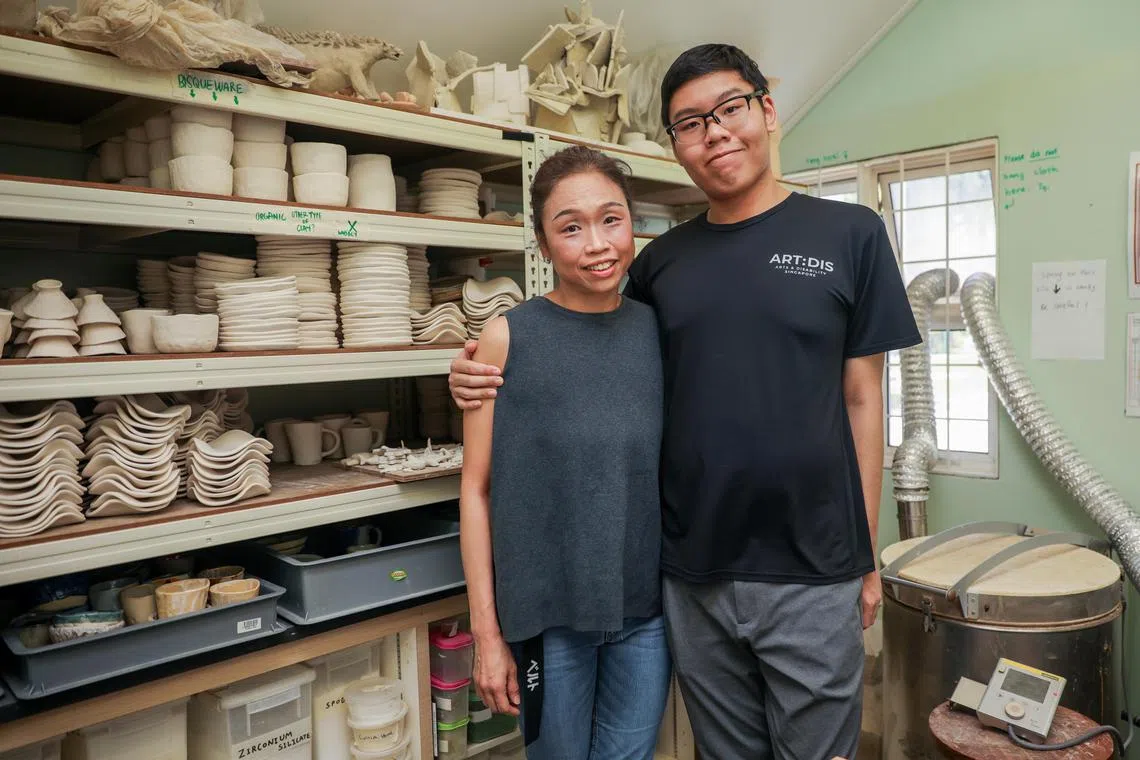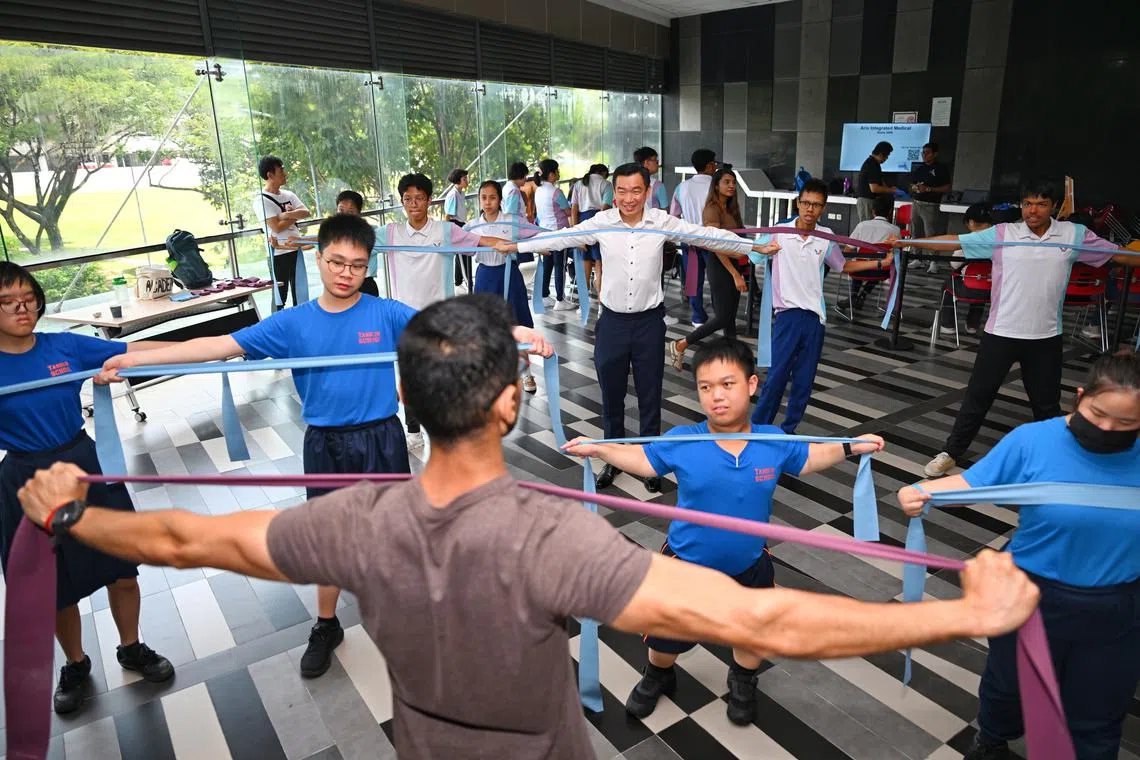Singapore task force outlines plans to help more people with disabilities find jobs
Sign up now: Get ST's newsletters delivered to your inbox

Mr Zack Ling, who has autism, said it is a good idea to offer gig jobs to persons with disabilities as it not only brings in some income, but also work experience.
ST PHOTO: LUTHER LAU
SINGAPORE – An estimated 4,500 more people with disabilities (PWDs) in Singapore are expected to have jobs by 2030, as part of efforts to increase the employment rate of this group to 40 per cent.
A task force looking at ways to reach this goal announced its recommendations in a report on Sept 16, laying out plans to grow the pool of inclusive employers, expand employment opportunities for PWDs and better equip job coaches.
The Government aims to increase the number of inclusive employers from more than 7,000 today to 10,000 by 2030,
Currently, close to four in five inclusive employers hire only one PWD, and can scale up efforts to hire more of them, said the task force.
As of now, the pool of 7,000 employers hire around 16,000 PWDs.
The recommendations by the Taskforce on Promoting Inclusive Employment Practices also include tapping gig work as a stepping stone for PWDs to join the workforce, and better equipping job coaches.
Mr Eric Chua, Senior Parliamentary Secretary for Social and Family Development, shared the recommendations at the Enabling Academy Learning Festival at the Lifelong Learning Institute in Eunos.
The Ministry of Social and Family Development (MSF) supports all the recommendations of the task force, formed in 2022 as part of the Enabling Masterplan 2030, which is Singapore’s road map for supporting PWDs and enabling them to contribute to society.
The average resident employment rate of PWDs aged 15 to 64 has risen from 28.2 per cent in 2018/2019 to 32.7 per cent in 2022/2023.
The task force comprised 17 members from the people, private and public sectors.
It is led by Ms Ku Geok Boon, chief executive of disability agency SG Enable, and Ms Susan Chong, CEO and founder of agri-tech firm Greenphyto, who is also a board member of the Singapore Business Federation Foundation.
Expanding pool of inclusive employers
The task force proposed to identify and develop companies to be inclusive, hiring “champions” in key sectors so that they can engage and inspire others to do the same.
The focus will be on six sectors that have hired PWDs or have growing potential of job opportunities for them.
These sectors are: food and beverage services, retail trade, information and communications, health and social services, transport and storage, as well as financial and insurance services.
Employers need more support, said the task force, in covering the cost to hire and equip an inclusive workplace champion who will lead the implementation of such practices and policies within the organisation, or an in-house job coach.
MSF is studying the recommendation to provide funding support to employers to build up in-house capabilities in inclusive hiring practices, and will provide an update in the coming months.
More work opportunities
Another recommendation is to expand employment opportunities by tapping short-term assignments or gig jobs as avenues for PWDs to return to the workforce, and possibly progress to formal employment.
Among resident PWDs aged 15 to 64 who were unemployed, about 20 per cent were previously employed within the last five years. They may face barriers returning to the workforce, such as the need for more flexible work, said the task force in its report.
MSF and SG Enable aim to place 200 PWDs into gig jobs annually by 2026. They also hope to support 70 per cent of them to continue engaging in gig work, or move on to secure formal employment within six months after being placed into their gig job.
A pilot by Workforce Singapore and SG Enable since May 2023 to match PWDs with gig jobs has seen early success, said the report. Over 100 PWDs found jobs through the scheme, and more than 40 per cent transited into more stable employment.
Close to 60 per cent of those placed in gig jobs through this pilot had not been employed for at least six months. These include about 35 per cent who did not have employment history since 2018.
Mr Zack Ling, who has autism, said it is a good idea to offer gig jobs to PWDs as this brings in income and work experience.

Mr Zack Ling, 19 and his mother, Ms Julie Wong, 53, at ART:DIS, where he gets commissioned to produce ceramics like sake cups.
ST PHOTO: LUTHER LAU
The 19-year-old product design student at the Institute of Technical Education is an artist-in-training with non-profit organisation ART:DIS,
“I learnt to take criticisms to improve, and build up my resilience,” he told The Straits Times. “It’s better to learn something than idling at home.”
He hopes to be a product designer in future.
His mother, Ms Julie Wong, a 53-year-old teacher, said: “Hopefully, there are more organisations that can come forward and provide PWDs with such work opportunities.”
Support for job coaches
Job coaches – who work with PWDs and employers to identify suitable job matches – need to be equipped to ensure their skills and industry knowledge are up to date, said the task force.
There are about 200 job coaches today working in social service agencies, special education schools and private organisations providing job support to PWDs.
The task force hopes to increase the pool to serve 4,500 more PWDs.
Currently, there is no clear set of competencies and recommended baseline training required for these job coaches.
The Government aims to ensure that all job coaches in MSF-funded services have met baseline training requirements by 2030.
These requirements would take reference from the Job Coach Career Map, within SG Enable’s newly launched Enabling Skills and Competencies Framework.
The new framework, which was also launched on Sept 16, sets out the skills and competencies needed by PWDs and their network of support, including caregivers, employers and disability sector professionals.
Meant to provide a common skills language, it references the Ministry of Education’s special education teaching and learning syllabus, as well as information from SkillsFuture Singapore on in-demand skills, employment and career pathways.

Mr Eric Chua, Senior Parliamentary Secretary for Social and Family Development, taking part in a fitness class at the Lifelong Learning Institute in Eunos on Sept 16, 2024.
ST PHOTO: SHINTARO TAY
Job coaches will also visit companies across the six sectors identified, so they can better understand the job opportunities and functions of the industries.
Mr Gobinath Muniandy, rooms division manager and an in-house coach with Pan Pacific Singapore, recognises the importance of continuous upskilling.
The 46-year-old has completed SG Enable’s training, including the Advanced Certificate in Supported Employment, to better support colleagues with disabilities.
Ms Wee Wei Ling, executive director of sustainability partnerships, lifestyle and asset at Pan Pacific Hotels Group, said:“Through these courses, employees not only enhance professional skills and coaching confidence, but also bring valuable knowledge and best practices back to the organisation. This supports the effective integration of persons with disabilities, ensuring they receive the skills and support needed to thrive in an inclusive work environment.”
Mr Chua said much progress has been made under the Enabling Masterplan 2030
“As we work towards 2030, we will continue to do more, particularly in the post-18 space, and we need more in society to come on board this collective journey of disability inclusion,” he said.
“Ultimately, we want to make it possible for people of all abilities to participate fully in society, and to reach their fullest potential in life.”


